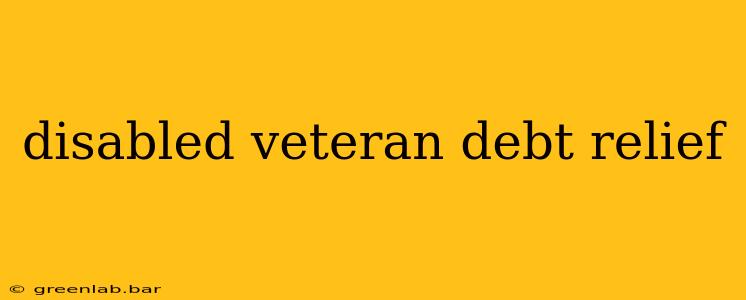Many disabled veterans face significant financial challenges, often compounded by the high costs of healthcare, adaptive equipment, and everyday living expenses. Debt can become a crippling burden, impacting mental health and overall well-being. Fortunately, several resources and programs are available to provide disabled veteran debt relief. This comprehensive guide explores the options, offering insights and strategies for navigating the complex landscape of financial assistance.
Understanding the Unique Financial Needs of Disabled Veterans
The challenges faced by disabled veterans are unique. Service-connected disabilities can lead to lost income, increased medical expenses, and the need for specialized care and equipment. These factors often contribute to a cycle of debt that can be difficult to break. Understanding the specific financial hurdles faced is crucial to accessing appropriate relief. This includes:
- Lost Income: Disabilities can limit employment opportunities or necessitate reduced work hours, resulting in lower income.
- Medical Expenses: The cost of healthcare, medication, and therapy can be exorbitant, especially for veterans with severe disabilities. Even with VA healthcare, out-of-pocket expenses can quickly accumulate.
- Adaptive Equipment: Wheelchairs, prosthetics, and other assistive devices can be incredibly expensive, placing a further strain on already limited resources.
- Home Modifications: Adapting a home to accommodate disabilities may require significant renovations, creating additional debt.
Exploring Debt Relief Options for Disabled Veterans
Several resources and programs can help disabled veterans manage and alleviate their debt burden. It's important to explore all available options to find the best solution for your individual circumstances.
1. VA Debt Relief Programs
The Department of Veterans Affairs (VA) offers several programs designed to assist veterans in financial distress. These may include:
- VA Home Loan Modification: For veterans facing foreclosure on their VA-backed home loan, the VA offers programs to help modify loan terms and prevent foreclosure.
- VA Healthcare Benefits: Maximizing VA healthcare benefits can significantly reduce medical expenses. Understanding the scope of coverage and available resources is essential.
- Disability Compensation: Veterans with service-connected disabilities are eligible for monthly disability compensation. Ensure your disability rating accurately reflects your condition to receive the maximum benefit.
2. Non-VA Debt Relief Options
Beyond the VA, other resources can provide crucial assistance:
- Debt Consolidation: Consolidating multiple debts into a single loan can simplify payments and potentially lower interest rates. This can make managing debt more manageable.
- Debt Management Plans: Credit counseling agencies can help create debt management plans to negotiate lower payments with creditors.
- Bankruptcy: In extreme cases, bankruptcy may be an option to discharge certain debts. However, this should be considered a last resort and requires professional legal advice.
- Charitable Organizations: Numerous charitable organizations provide financial assistance to veterans, offering grants or emergency funds for critical needs. Research local and national organizations to find potential support.
3. Negotiating with Creditors
Directly contacting creditors to negotiate repayment plans is another avenue to explore. Many creditors are willing to work with veterans facing financial hardship. Be prepared to explain your situation clearly and provide documentation supporting your claim.
Seeking Professional Guidance
Navigating the complexities of debt relief can be overwhelming. Consider seeking professional assistance:
- VA Benefits Counselor: A VA benefits counselor can provide personalized guidance on accessing available resources and programs.
- Financial Advisor: A financial advisor can offer expert advice on debt management strategies and long-term financial planning.
- Legal Counsel: If considering bankruptcy or complex legal issues, consulting an attorney specializing in veteran's affairs is highly recommended.
Proactive Financial Planning for Disabled Veterans
Preventing future debt is crucial. Proactive financial planning includes:
- Budgeting: Creating and maintaining a realistic budget is essential to track income and expenses.
- Emergency Fund: Building an emergency fund to cover unexpected expenses can help avoid accumulating debt.
- Financial Literacy: Improving financial literacy through courses or workshops can enhance your ability to manage finances effectively.
Successfully navigating the financial challenges faced by disabled veterans requires proactive planning, resourcefulness, and a willingness to seek assistance. By utilizing the available resources and seeking professional guidance, disabled veterans can regain financial stability and focus on their well-being. Remember, you are not alone, and help is available.

